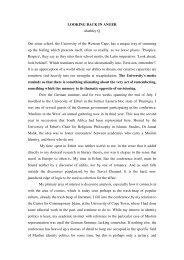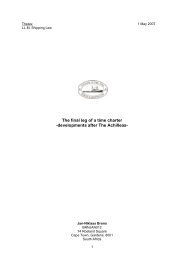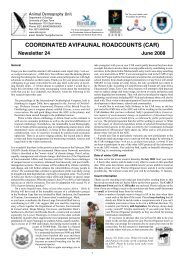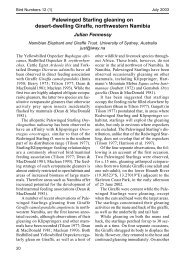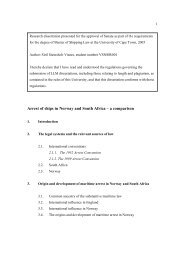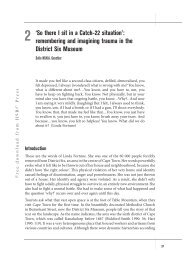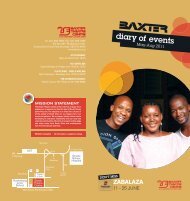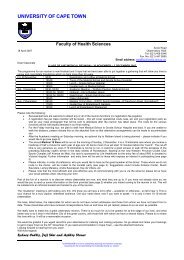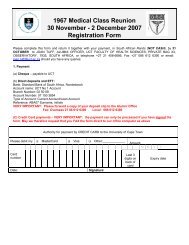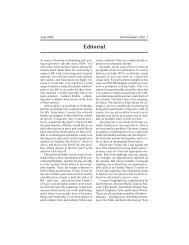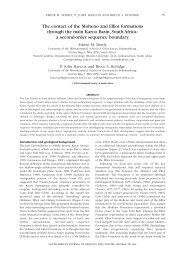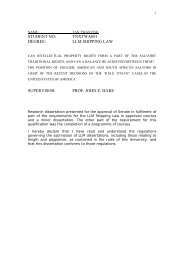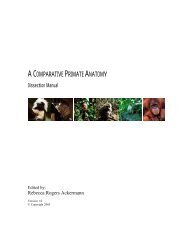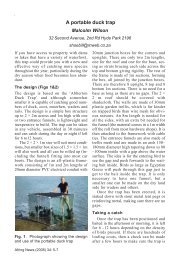insanity.pdf
insanity.pdf
insanity.pdf
You also want an ePaper? Increase the reach of your titles
YUMPU automatically turns print PDFs into web optimized ePapers that Google loves.
Africa 17<br />
an indispensable role because the court itself is in a good position to make a<br />
decision based on the facts of the case. Burchell (1995) views the indecision<br />
regarding the importance of this testimony as problematic. There are instances<br />
when courts do not receive a balanced view of the accused’s actions because<br />
the state has not adduced psychiatric or psychological evidence. He suggests<br />
that judges should require the state to lead such evidence so as to mitigate<br />
against a one-sided view of the accused’s actions.<br />
The ambivalent attitude which courts have towards expert testimony is further<br />
fuelled by the courts’ concern as to the accused’s reliability and truthfulness<br />
since this defence hinges on the accused’s account of events. Burchell (1995)<br />
says that this defence by its very nature, is viewed with caution and if the<br />
accused’s reliability and truthfulness are questionable then the expert<br />
testimony will also be viewed in the same light (see, for example, S v<br />
Potgieter 1994 (1) SACR 61 (A). Burchell (1995) argues that one of the<br />
problems which arises in the forensic assessment of an accused, is that it<br />
occurs before the evidence has been heard in court. Therefore in pursuit of the<br />
truth, it would be advisable to allow the expert to re-evaluate his/her opinion<br />
after the factual evidence has been led. In this way greater weight may be<br />
given to such evidence after it has been established that the accused has<br />
provided the court with a convincing account of events.<br />
Finally, while the defence has been the focus of legal debate, it has also<br />
received some attention from mental health professionals, albeit to a lesser<br />
extent. The focus of discussion in these circles has been on the nature of<br />
expert evidence which is adduced (Van Rensburg & Verschoor, 1989; Strauss,<br />
1995; Van der Merwe, 1997). However the role of expert testimony in these<br />
cases has raised particular challenges for experts, and Zabow (1990) says that<br />
they ‘have been less than successful in attempting to adapt theory, diagnosis<br />
and clinical method to the framework of existing legal standards’ (p.5). In<br />
addition, in these cases experts do not have recourse to textbook diagnoses<br />
which can describe temporary cognitive or conative impairment (Strauss,<br />
1995).<br />
The discussion has shown that South African courts have been more accepting<br />
of the role of psychological factors in negating criminal responsibility but it<br />
would seem that a rather ambivalent attitude towards expert testimony<br />
prevails. As Boister concludes ‘[t]his indicates clearly that the crucial aspect<br />
of the defence of non-pathological criminal incapacity is not its psychological<br />
validity but its legal validity’ (1996, p. 373).<br />
Summary<br />
1. The legal test for <strong>insanity</strong> in South Africa has a biological component<br />
(ie the presence of mental illness) and a psychological component (the<br />
impairment of cognitive and/or conative functioning).<br />
2. The diagnosis of mental illness falls within the domain of psychiatrists<br />
and psychologists while the assessment of criminal responsibility falls<br />
within the domain of the court.<br />
3. In the defence of automatism the voluntariness of the act is in question.<br />
The person cannot be held criminally liable because the act is



